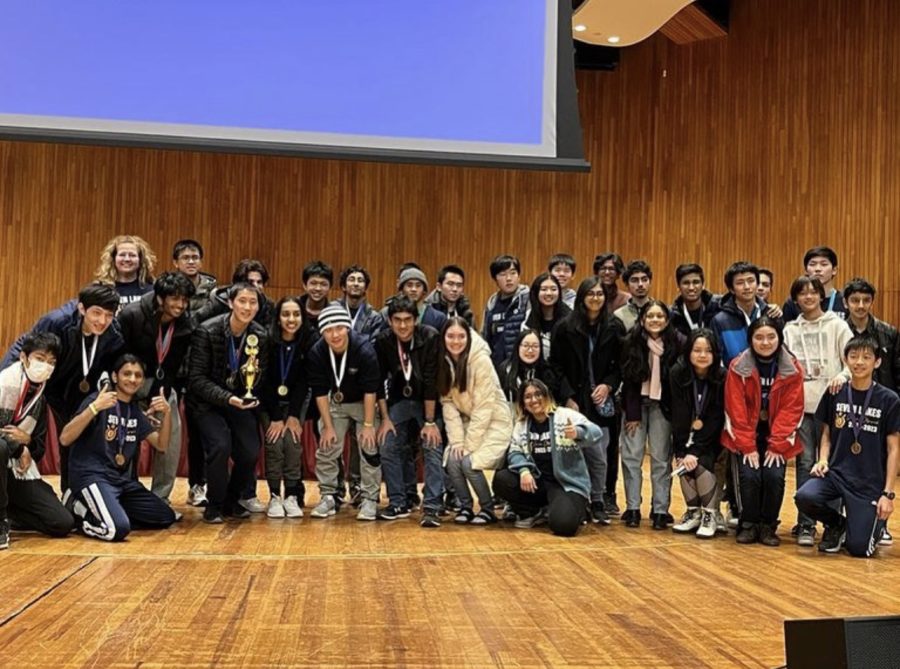Unlimited Team Chemistry
“I would say as long as you’re invested and you are a good team player, Science Olympiad is for you. I think it’s for everyone, and I think anyone can participate.”
Science Olympiad. It’s an extracurricular activity that far too often gets mistaken as an exclusive, highly rigorous competition for only the best and brightest in the fields of biology or chemistry. However, Science Olympiad stretches far and wide into the realms of science and offers a multi-faceted outlet for any students who are interested in the prospect of a career in STEM.
“I think that people kind of overestimate Science Olympiad. People think ‘oh, you need to be so smart to do Science Olympiad,’ but it’s not really that,” senior Akash Joseph said. “It’s mostly just preparation and just being invested in the events you are doing. Because Science Olympiad covers such a broad area [of topics], you’ll find something that you like in it.”
At competitions, there are 22 different categories that vary from topics such as Anatomy and Physiology to Remote Sensing. Each category is tackled by a pair of teammates, who have time before each tournament to prepare together.
“A lot of the preparation is like meeting up with a partner in your own time. We have binder events, where a lot of people showed up over winter break and spent hours and hours just compiling pictures and notes,” junior Owen Dong said. “For the chemistry events, shout out to Mr. Ramos, and Mrs. Irving, who both let us use the prep rooms to mess around with chemicals and stuff. I know a lot of our build [teams] were going to the gym to fly their planes around a lot of times.”
Joseph, alongside his partner, was incredibly successful at the MIT Invitational tournament in January. They placed second overall in Remote Sensing and performed strongly in their other two events as well.
“Basically, me and my partner had clear divisions on the topics we’re strong in, so I just trusted him to learn and do his part because remote sensing is a wide event, and it covers many big topics,” Joseph said. “One’s physics, one’s analysis of satellite imagery, and the other one’s climate. I knew that I could cover the physics side of it and he could cover the climate side of it, so I could focus on my side. So we just split the topics, and I think that’s what worked for us.”
The MIT Invitational is a prestigious Science Olympiad competition that very few teams across the country get to participate in. As they placed top-10 at nationals the prior year, the Seven Lakes team was granted automatic entry, and they didn’t disappoint. The team placed an impressive third overall out of 66 teams.
“I’m really proud of the team, I was not expecting third place for sure,” Dong said. “Instant reaction was just, ‘how did we clutch up?’ type of thing. I don’t know, honestly I don’t even remember because it was a blur of emotions. It hits you and then you digest it and it’s like wow, okay.”
The MIT Invitational was more than just a competition for the team, however. As they had to travel to Boston for the competition, there was plenty of time for the members to bond and enjoy each other’s company.
“We selected a lot of underclassmen to compete at MIT, because we wanted them to get the exposure,” Joseph said. “The past couple of years, we have been restricted to mostly online tournaments, and we haven’t had the chance to like come together as a team and travel and have that bonding experience, so i think the best part of MIT was to have the ability to like interact and like become much better friends with the underclassmen and the people I wasn’t originally that close to.”
As one of the team captains, Joseph attests a lot of his team’s success to their chemistry and overall support of one another.
“I think that the team culture that we try to enforce is a culture of openness. We recruit from a wide age range, we don’t want to have a team of all seniors, and we want to have freshmen and sophomores competing because they’re going to be the future core of the team in the coming years,” Joseph said. “I think we have a more collaborative team than other teams, and we’re not telling people that oh, you have to study this, you have to do this event, we kind of let people grow into their own mold and do what they want. Ultimately motivation from a more organic place from yourself is always going to be stronger than someone telling you what to do.”
Members of the team are very supportive of one another and also for prospective members who are concerned about the challenges of Science Olympiad.
“There’s not a good way to generalize [Science Olympiad]. We have build events where people are building planes or building contraptions, and we have chemistry events where people are in the lab making random explosions and cool stuff, then we have physics events and bio events,” Dong said. “So I feel like if you’re interested in just collaborating with other people and you have a general interest in science, then I think Science Olympiad is for you.”
Tyler Welch is in his senior year and his third year as a member of the Torch staff. It is also his second year as the Print Editor-in-Chief. He also plays baseball for the school and is an avid Yankees fan. Tyler is looking forward to his final year...


